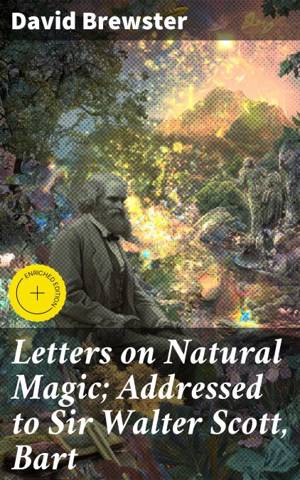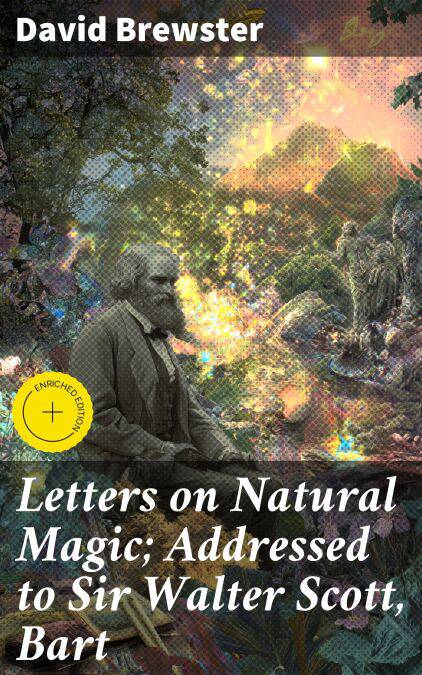
Bedankt voor het vertrouwen het afgelopen jaar! Om jou te bedanken bieden we GRATIS verzending (in België) aan op alles gedurende de hele maand januari.
- Afhalen na 1 uur in een winkel met voorraad
- In januari gratis thuislevering in België
- Ruim aanbod met 7 miljoen producten
Bedankt voor het vertrouwen het afgelopen jaar! Om jou te bedanken bieden we GRATIS verzending (in België) aan op alles gedurende de hele maand januari.
- Afhalen na 1 uur in een winkel met voorraad
- In januari gratis thuislevering in België
- Ruim aanbod met 7 miljoen producten
Zoeken
Letters on Natural Magic; Addressed to Sir Walter Scott, Bart E-BOOK
Enriched edition. Exploring the Enchanting World of Natural Magic
David Brewster
E-book | Engels
€ 0,49
Omschrijving
In "Letters on Natural Magic; Addressed to Sir Walter Scott, Bart," David Brewster eloquently explores the intersections of science, art, and imagination in the pursuit of understanding natural phenomena. Written in an epistolary format, the book presents a series of engaging letters that combine empirical inquiry with poetic musings. Brewster delves into the marvels of the natural world, from optical illusions to the wonders of light, employing a style that is both accessible and richly descriptive, reflective of the Romantic era's fascination with nature and the sublime. His work serves as a bridge between the emerging scientific rationalism and the mystical appreciation of nature endemic to 19th-century literature, firmly placing him in the intellectual landscape alongside contemporaries like Sir Walter Scott himself. David Brewster, a Scottish scientist and philosopher, was deeply influenced by the Enlightenment's emphasis on inquiry and discovery. His background in optics and his role as a popularizer of science drove him to communicate complex ideas in a relatable manner. Brewster's friendships with luminaries such as Scott reveal the multi-faceted cultural landscape he inhabited, which emphasized both factual understanding and aesthetic appreciation of the natural world. This book is highly recommended for readers interested in the interplay between science and literature, as well as the historical context of scientific discovery. Brewster's insightful reflections offer a profound understanding of natural magic that invites readers to contemplate the wonders that lie in both nature and the human imagination.
In this enriched edition, we have carefully created added value for your reading experience:
- A succinct Introduction situates the work's timeless appeal and themes.
- The Synopsis outlines the central plot, highlighting key developments without spoiling critical twists.
- A detailed Historical Context immerses you in the era's events and influences that shaped the writing.
- A thorough Analysis dissects symbols, motifs, and character arcs to unearth underlying meanings.
- Reflection questions prompt you to engage personally with the work's messages, connecting them to modern life.
- Hand‐picked Memorable Quotes shine a spotlight on moments of literary brilliance.
- Interactive footnotes clarify unusual references, historical allusions, and archaic phrases for an effortless, more informed read.
In this enriched edition, we have carefully created added value for your reading experience:
- A succinct Introduction situates the work's timeless appeal and themes.
- The Synopsis outlines the central plot, highlighting key developments without spoiling critical twists.
- A detailed Historical Context immerses you in the era's events and influences that shaped the writing.
- A thorough Analysis dissects symbols, motifs, and character arcs to unearth underlying meanings.
- Reflection questions prompt you to engage personally with the work's messages, connecting them to modern life.
- Hand‐picked Memorable Quotes shine a spotlight on moments of literary brilliance.
- Interactive footnotes clarify unusual references, historical allusions, and archaic phrases for an effortless, more informed read.
Specificaties
Betrokkenen
- Auteur(s):
- Uitgeverij:
Inhoud
- Aantal bladzijden:
- 1806
- Taal:
- Engels
Eigenschappen
- Productcode (EAN):
- 4057664574442
- Verschijningsdatum:
- 1/12/2019
- Uitvoering:
- E-book
- Beveiligd met:
- Digital watermarking
- Formaat:
- ePub

Alleen bij Standaard Boekhandel
Beoordelingen
We publiceren alleen reviews die voldoen aan de voorwaarden voor reviews. Bekijk onze voorwaarden voor reviews.









